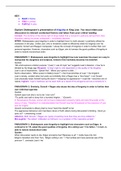Other
A Level English Literature Edexcel King Lear Essay Plans (Paper 1: Drama)
- Course
- Institution
- Book
A compilation of mini essay plans made on past paper questions for the King Lear text under the Edexcel syllabus, including introductions, argument strands, pieces of context and critics.
[Show more]




